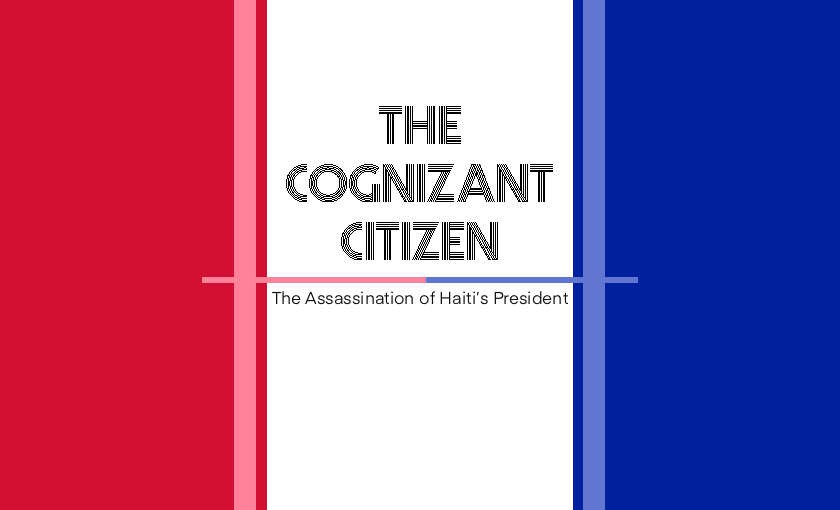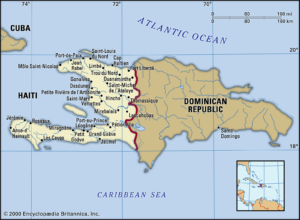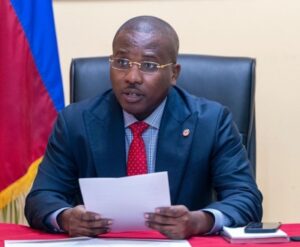
The president of Haiti, Jovenel Moïse, was assassinated in Pétion-Ville, Haiti on July 7, 2021.

Moïse had started his first company Jomar Auto Parts with little initial investment and gradually began expanding his fields of business. Soon, Moïse was the first man to export bananas from Haiti to Germany (since 1954) thus, earning the title of “Banana Man” and further gaining popularity in the country. Long after non-interim preceding President Michel Martelly stepped down from his post of presidentship in February 2016, he delegated Jovenel Moïse as a potential succeeding president. In November 2017, Moïse won the elections with a thumping majority of 55.67% votes and remained in the position until his death.
POLITICAL AND SOCIO-ECONOMIC CRISIS IN HAITI:
Back in 2010, when a devastating earthquake struck Haiti, the country was left with desperate humanitarian needs. As a member of the Petrocaribe, Venezuela then provided subsidized oil to Haiti. It was a twenty-five agreement with 1% interest and one or two years of grace to pay off the debts.
In a few years, it was revealed that $2 billion of the funds were embezzled by former Haitian government officials and, most likely, President Moïse’s government as well. Soon after, in March 2018, Venezuela stopped shipping oil to Haiti, which led to a drastic 50% hike in fuel prices, thus causing chaos among the citizens. Protests to reduce fuel prices immediately began.
In a few months, Haitians were brought to the streets with nowhere to go. Furious by the revelations of swindling activities against the government, protests persisted across the country ever since.

Though President Moïse was elected on February 7, 2016, he was sworn in as President in November 2017. He postponed the legislative elections from October 2019 to October 2021 and had been ruling by decree. Coupled with accusations of fraud and corruption, the citizens protested and questioned the legitimacy of his rule, demanding his resignation. However, President Moïse had a differing opinion: he should complete his term duly for five years from the day of swearing-in.
In 2020, the citizens allegedly blamed the government for mishandling the Covid-19 pandemic situation in the region. Even the police disputed, demanding better pay and working conditions. Inevitably violence and discontent prolonged through 2021. Many have been killed, and more have been injured during the riots.
The country has been in turmoil and unrest before the president’s death.
INVESTIGATION AND POSSIBLE SUSPECTS:
The Haitian officials have claimed foreign involvement in the assassination. But many suspect that the attack could have been executed with the help of the president’s security. Despite the presence of at least 100 officers guarding the president’s home, the onslaught of assassins did not meet substantial resistance. Members of the president’s security detail, businessmen and politicians believed to be President Moïse’s rivals have been summoned by the Haitian courts for questioning.
More than two dozen individuals involved in the attack have been identified by the authorities. This includes 26 Colombians and 2 Haitian Americans, Joseph Vincent and James J. Solages. In the past, Solages had worked as a security guard at the Canadian Embassy in Haiti. Twenty individuals involved in the attack have been detained.
According to a judge involved in the investigation, the two Americans claim to have only worked for the assassins as translators and were absent in the room where the president was killed. They also assert that arresting the president and bringing him to the national palace was the goal, not killing him. They admitted planning it for a month by meeting with others involved in a hotel in Pétion-Ville.
The defence ministry of Colombia has confirmed that 13 of the suspects were former members of its military, out of which two had died in the violence following President Moïse’s death. According to Colombia’s National Police Director, General Jorge Luis Vargas, four businesses that are believed to have recruited those involved in the attack are being investigated by them. The defence department also said that top intelligence officials from Colombia will be assisting with the ongoing investigation. Some of the Colombian suspects’ relatives maintain that they were hired by security companies and were unaware that President Moïse was going to be killed.
Following the attack, civilians assisted the police to catch some of the assassins hiding in the bushes. Some went far by setting fire to three of the suspects’ cars which destroyed evidence.
Haitian authorities say that at least six more suspects are on the run. The police had killed three of the suspects in the aftermath.
The attackers’ motives and the organiser behind the attack are yet to be ascertained.
CURRENT POLITICAL SITUATION:
The situation is worsened by the uncertainty of who is the rightful leader of Haiti.
As per the constitution, the National Assembly must choose another president. However, due to disputes that hindered the October 2019 election, Haiti has no functioning parliament. Twenty out of thirty senators’ terms expired last year. The Chief Justice of Haiti who could have provided leadership had succumbed to Covid-19.
The amendments to the constitution say the prime minister should take over. But the amendments have not been accepted by many.

Following the assassination, interim Prime Minister Claude Joseph took command of the army and the police. He has put Haiti under martial law by declaring a state of siege for 15 days. An opposition senator, Patrice Dumont, claimed that Joseph has launched a coup by assuming national authority.

Ariel Henry was appointed as the new prime minister by President Moïse two days before his death. Henry, who was supposed to be sworn in this week, states that he is the rightful prime minister. A resolution was signed by 8 senators, declaring Joseph Lambert, the Senate President as interim president and called for Ariel Henry to replace Claude Joseph as prime minister. The decision has been supported by civil society leaders and opposition parties.
Another group of civil society members has plans to try and bring major changes to the constitution and have a coalition temporarily run the country.
Many of its citizens believe that the presidential elections scheduled for September would only prolong their issues as Moïse had been ruling by decree and the governing institutions in the country are weak.
The state of the country politically and economically remains ambiguous.
SUPPORT:
The Haitian government has requested the United States to send troops to protect their country despite a history of unwanted military interventions by the latter. The uncertain state of politics, increase in gang violence and the pandemic crisis called for this measure. However, members of the civil society and intellectuals believe that Haitians must resolve the issue on their own without the aid of an outside power which they believe contributes to their problems.
Mathias Pierre, the Haitian minister of elections, stated that help was requested because President Joe Biden and Secretary of State Antony Blinken had promised to assist the country. The White House press secretary has said that FBI and homeland security officials would be sent to ascertain how to help Haiti with their investigation. A senior official of the Biden administration claimed that plans have not been made for giving military assistance. However, Biden officials are believed to be focussing on helping the country with its security needs without military forces, possibly through training for Haitian police and military by the United States. Haiti has now requested the United Nations for troops to protect the country’s infrastructure and assist in security.
Many civilians went to the US Embassy in Haiti seeking asylum and humanitarian visas following President Moïse’s assassination and the prevailing unrest. The United States has not started extensively handing out humanitarian visas of late.
The World Bank released a statement saying they would continue to support Haiti.
Written by Deepthi Priyanka C and Vaishnavi Karkare for MTTN
Edited by Cynthia Maria Dsouza for MTTN
Featured image by R S Aruna for MTTN
Image Source (in order): The Guardian, Encyclopaedia Britannica, The New York Times, Haiti Libre
SOURCES: ANI News, BBC, Miami Herald, The New York Times
Leave a Reply
You must be logged in to post a comment.